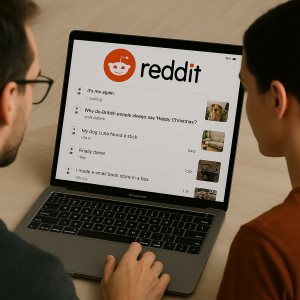 Reddit’s shadowban system has long been a key part of how the platform enforces its rules. Unlike outright bans, which notify users and cut off access, shadowbans are stealthy. A user can still post and comment, but no one else sees it. The idea is to limit the reach of spam or abusive behavior without sparking confrontation or ban evasion. However, this quiet moderation method also tells a larger story—about how platforms across the web are evolving in their enforcement of rules, management of user behavior, and response to the pressure to keep online spaces safe. If you suspect you’ve been affected, try this free tool to check your shadowban status.
Reddit’s shadowban system has long been a key part of how the platform enforces its rules. Unlike outright bans, which notify users and cut off access, shadowbans are stealthy. A user can still post and comment, but no one else sees it. The idea is to limit the reach of spam or abusive behavior without sparking confrontation or ban evasion. However, this quiet moderation method also tells a larger story—about how platforms across the web are evolving in their enforcement of rules, management of user behavior, and response to the pressure to keep online spaces safe. If you suspect you’ve been affected, try this free tool to check your shadowban status.
The Origin of Shadowbans
The term “shadowban” originated on early internet forums, where users could be muted without knowing it. Reddit adopted the practice in its early years as a way to deal with spambots and persistent trolls. The logic was straightforward: if someone didn’t know they were banned, they were less likely to create a new account to get around it. This invisible barrier could reduce spam while avoiding direct conflict.
Over time, Reddit shifted away from global shadowbans managed by site admins to more localized and transparent tools. Today, most moderation occurs at the subreddit level, where volunteer moderators can remove posts, mute users, or apply auto-moderator scripts that mimic shadowbans. Reddit itself still reserves the right to shadowban at the platform level, though it does so more selectively and with more policy oversight.
Quiet Moderation, Broad Implications
What makes Reddit’s shadowban system interesting isn’t just the tool itself but what it represents. It’s a form of “quiet moderation”—actions taken by platforms that limit harmful behavior without public notice or user feedback. This concept has spread well beyond Reddit. Platforms like Twitter (now X), TikTok, and Instagram have experimented with similar invisible penalties. Algorithms might de-rank a user’s content, hide comments from public view, or suppress reach without any visible punishment.
In each case, the goal is the same: reduce harm while avoiding escalation. Shadowbans aims to disincentivize bad behavior without fueling outrage or encouraging gaming of the system. They are part of a wider shift from reactive moderation—deleting posts after the fact—to proactive and preemptive measures.
Ties to Internet Governance Models
Reddit’s approach also reflects a larger tension in internet governance: how to balance transparency with effectiveness. Critics of shadowbanning argue that it undermines due process. If users don’t know they’ve been penalized, how can they appeal or change their behavior? On the other hand, transparency can also lead to manipulation. If bad actors understand how moderation works, they’ll find ways around it.
This is a common dilemma in internet policy. Governments, platforms, and civil society groups continue to debate the extent of control platforms should exert and the level of accountability they owe to users. Reddit’s system leans into a more centralized but opaque model—where decisions are made by platform staff or subreddit mods, often using automated tools. This reflects a broader move toward what some researchers call “platform governance,” where rules are enforced algorithmically, often in real-time, and with limited user input.
Real-Time Moderation Technology
One of the most significant developments in recent years has been the adoption of real-time moderation tools. Reddit’s Automoderator, for instance, can filter posts the moment they’re submitted based on keywords, user history, or metadata. Other platforms go further. TikTok utilizes AI to detect and remove harmful content seconds after it’s uploaded. YouTube uses machine learning to demonetize or remove videos before human reviewers have a chance to review them.
These tools borrow from shadowban logic. They act without explicit warnings and rely on behavioral patterns to decide who gets silenced or sidelined. They’re not perfect—false positives and bias in training data remain serious concerns—but they show how moderation is becoming more predictive and less reactive.
The Future of Online Moderation
As the web becomes more fragmented and global, moderation systems are under pressure to scale, adapt, and avoid backlash. Reddit’s shadowban strategy shows both the promise and the pitfalls. Quiet enforcement can be efficient and low-drama. But it can also feel unfair, especially when users are left in the dark.
The broader trend is clear: moderation is moving toward a mix of automation, soft penalties, and invisible controls. Whether it’s Reddit muting a troll, Instagram downranking misinformation, or YouTube tweaking recommendations, platforms are trying to shape behavior subtly and systematically. This mirrors real-world governance models as well—where rules are enforced through systems and signals rather than direct punishment.
Ultimately, Reddit’s shadowban system is more than a relic of its early days. It’s a microcosm of how platforms today attempt to balance control and consent, efficiency and fairness. As moderation becomes more technical and less transparent, the challenge for platforms—and their users—is ensuring that those systems remain accountable, even when they operate in the shadows.
